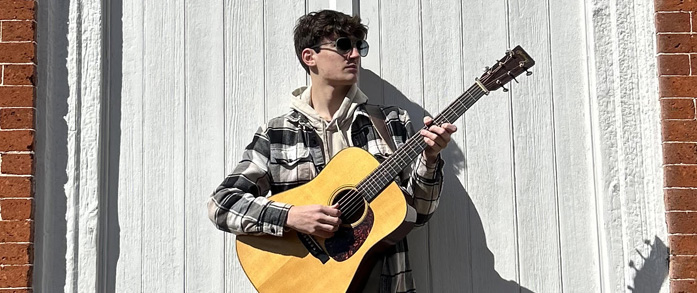Devin Jones, a first year guitar student at the Berklee College of Music in Boston, has been awarded a Fletcher Bright Endowed Scholarship to help pay for his ongoing studies. Fiddler Ruth Shumway was also chosen to receive this scholarship. Both were given out at the recent 2024 String Awards on April 8 at Berklee for the String Department and the American Roots Program, which houses the bluegrass students.
Only playing bluegrass since he was 14, Devin has quickly grown into a fine musician. While a student in Boston, he also performs up and down the east coast with Ettore Buzzini, and has developed a mentor/mentee relationship with Bryan Sutton, initially through Artist Works, and then as a part of Bryan’s Blue Ridge Guitar Camp. At last year’s camp, Jones was invited onstage to play one with Bryan and Chris Eldridge at the NC Guitar Celebration Concert at the Brevard Music Center.
We caught up with the young flatpicker this week by phone, and he expressed how much it means to him to be awarded the Fletcher Bright Scholarship, and to be studying in Boston.
“Ever since I got my first guitar at 14, bluegrass has been the focal point of my life. Having the opportunity to study at Berklee under world class musicians has been an incredible experience, and I have learned a tremendous amount in just my first year.
I am extremely grateful and honored to have been recognized with this prestigious award.”
Bright was an enthusiastic Tennessee fiddler who achieved tremendous success in commercial real estate. Based in Chattanooga, Fletcher spent the later years of his life engaged in philanthropy towards young bluegrass artists studying their craft in college. He also endowed an ongoing scholarship managed by the IBMA Foundation.
For many years he performed with a group called The Dismembered Tennesseans, which was one of the chief joys of his life. Fletcher Bright died on Christmas day of 2017, at 86 years of age. He was as good friend as fiddle and bluegrass music ever had.
Here’s a recent video of Devin performing with Buzzini on banjo, Willie Marcher on fiddle, and Briar McDowell on bass at a house concert Tom Mindte put on in Gaithersburg, MD this past weekend.
Well done all!
Many congratulations to Devin on his scholarship award. We’ll definitely keep our eye on this young picker as he grows and develops.
